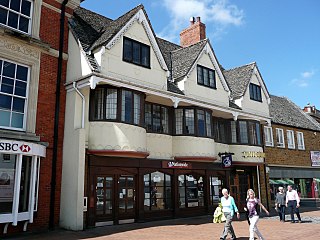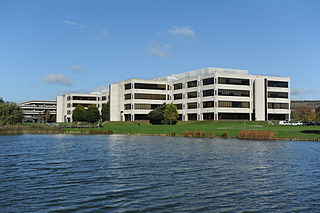
A building society is a financial institution owned by its members as a mutual organization, which offers banking and related financial services, especially savings and mortgage lending. They exist in the United Kingdom, Australia and New Zealand, and formerly in Ireland and several Commonwealth countries, including South Africa as mutual banks. They are similar to credit unions, but rather than promoting thrift and offering unsecured and business loans, the purpose of a building society is to provide home mortgages to members. Borrowers and depositors are society members, setting policy and appointing directors on a one-member, one-vote basis. Building societies often provide other retail banking services, such as current accounts, credit cards and personal loans. The term "building society" first arose in the 19th century in Great Britain from cooperative savings groups.

A cooperative is "an autonomous association of persons united voluntarily to meet their common economic, social and cultural needs and aspirations through a jointly owned and democratically-controlled enterprise". Cooperatives are democratically controlled by their members, with each member having one vote in electing the board of directors. They differ from collectives in that they are generally built from the bottom-up, rather than the top-down. Cooperatives may include:

A friendly society is a mutual association for the purposes of insurance, pensions, savings or cooperative banking. It is a mutual organization or benefit society composed of a body of people who join together for a common financial or social purpose. Before modern insurance and the welfare state, friendly societies provided financial and social services to individuals, often according to their religious, political, or trade affiliations. These societies are still widespread in many parts of the developing world, where they are referred to as ROSCAs, ASCAs, burial societies, chit funds, etc.
A worker cooperative is a cooperative owned and self-managed by its workers. This control may mean a firm where every worker-owner participates in decision-making in a democratic fashion, or it may refer to one in which management is elected by every worker-owner who each have one vote.
The United Kingdom is home to a widespread and diverse co-operative movement, with over 7,000 registered co-operatives owned by 17 million individual members and which contribute £34bn a year to the British economy. Modern co-operation started with the Rochdale Pioneers' shop in the northern English town of Rochdale in 1844, though the history of co-operation in Britain can be traced back to before 1800. The British co-operative movement is most commonly associated with The Co-operative brand which has been adopted by several large consumers' co-operative societies; however, there are many thousands of registered co-operative businesses operating in the UK. Alongside these consumers' co-operatives, there exist many prominent agricultural co-operatives (621), co-operative housing providers (619), health and social care cooperatives (111), cooperative schools (834), retail co-operatives, co-operatively run community energy projects, football supporters' trusts, credit unions, and worker-owned businesses.

Southern Co-op is a regional consumer co-operative in the United Kingdom. The principal activities of the Society are food retailing, funerals and cafés. It operates more than 300 convenience stores, funeral homes and Starbucks coffee shops. Its operations are mainly located in the southern English counties of Berkshire, Bristol, Buckinghamshire, Cornwall, Devon, Dorset, Hampshire, Isle of Wight, Kent, London, Somerset, Surrey, Sussex and Wiltshire. Southern Co-op society is owned by over 170,000 members who share in the business's profits and democratically control its operations. It was previously registered as an Industrial and Provident Society, but its status is now as a mutual society under the Co-operative and Community Benefit Societies Act 2014.

The Libraries Offences Act 1898 is an Act of the Parliament of the United Kingdom, applying in England and Wales.
Shared Interest Society Limited is a fair trade financial co-operative based in the United Kingdom formed in 1990. Today it provides credit and financial services to fair trade producers, retailers, importers and exporters throughout the world. Shared Interest works with both Fairtrade International and the World Fair Trade Organization (WFTO). In 2004, the Shared Interest Foundation was formed as a charitable subsidiary, providing training and support services to producers, complementing the financial services offered by the Society. Shared Interest received the Queen's Award for Enterprise in 2008.

Co-op Insurance is the trading name of CIS General Insurance, a general insurance company, which is part of the Co-operative Group, based in Manchester, United Kingdom. Co-op Insurance Services, an insurance intermediary incorporated in 2017, is a wholly owned subsidiary of CIS General Insurance.

UIA (Insurance) Limited was a mutual insurance company in the United Kingdom, providing general insurance products to members of the trade union movement and other not-for-profit organisations. It was a member of the Association of British Insurers, authorised by the Prudential Regulation Authority and regulated by the Financial Conduct Authority. UIA Limited was a wholly owned subsidiary, authorised and regulated by the Financial Conduct Authority.

The Co-operative and Community Benefit Societies and Credit Unions Act 2010 is an Act of the Parliament of the United Kingdom that received royal assent on 18 March 2010.

The Industrial and Provident Societies Act 1965 (c. 12) was an act of the Parliament of the United Kingdom that regulated industrial and provident societies in Great Britain and the Channel Islands.
Credit unions in the United Kingdom were first established in the 1960s. Credit unions are member-owned financial cooperatives operated for the purpose of promoting thrift, providing credit and other financial services to their members.
Hornsey (FIA) Co-operative Credit Union Limited was a savings and loans co-operative, established in the Municipal Borough of Hornsey, now part of the London Borough of Haringey, in 1964. One of the earliest credit unions in the United Kingdom, it merged with London Capital Credit Union in 2013.

Lister Housing Co-operative is a 185 flat housing co-operative and registered social landlord in Edinburgh's Old Town.
The Co-op Credit Union is a not-for-profit member-owned financial co-operative, based in Manchester and operating throughout the United Kingdom.

The Co-operative and Community Benefit Societies Act 2014 (c.14) is an Act of the Parliament of the United Kingdom. It consolidates existing legislation relating to industrial and provident societies, as well as introducing some reforms.

A company register is a register of organizations in the jurisdiction they operate under.









